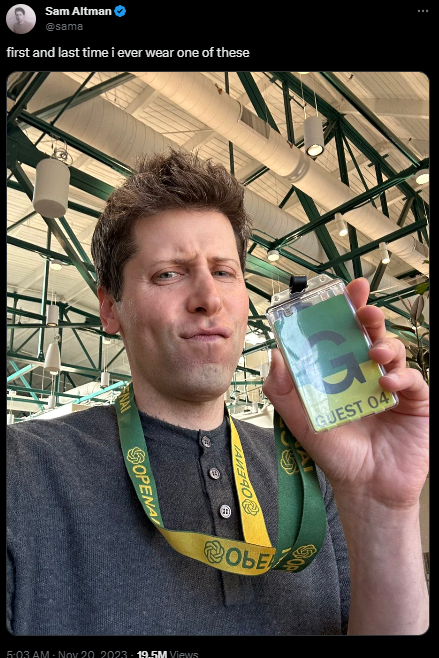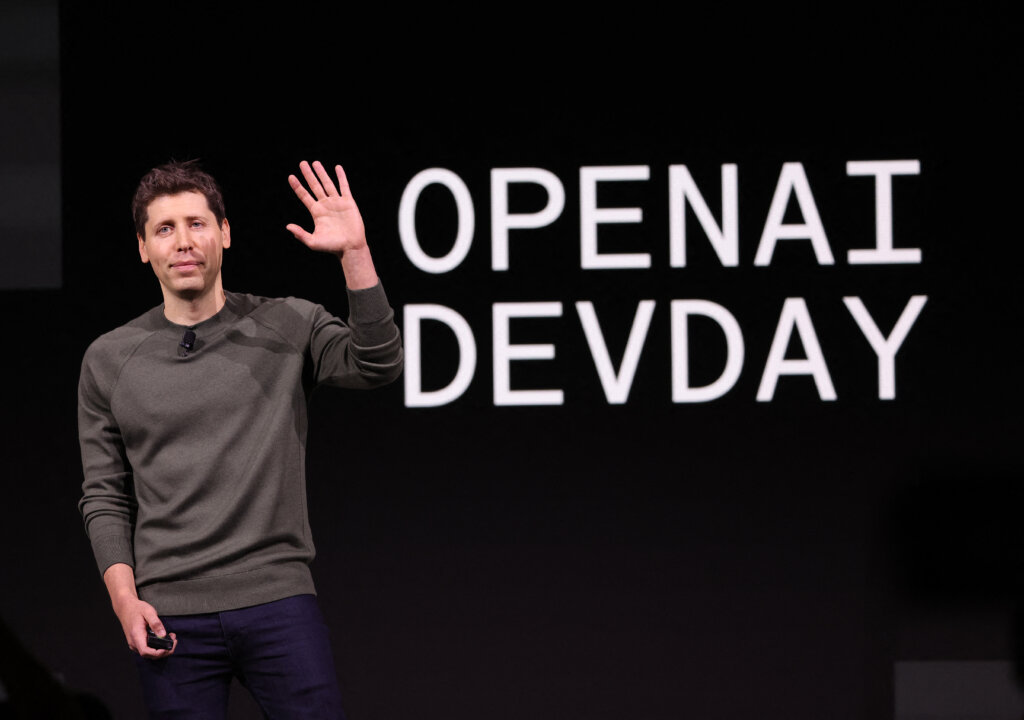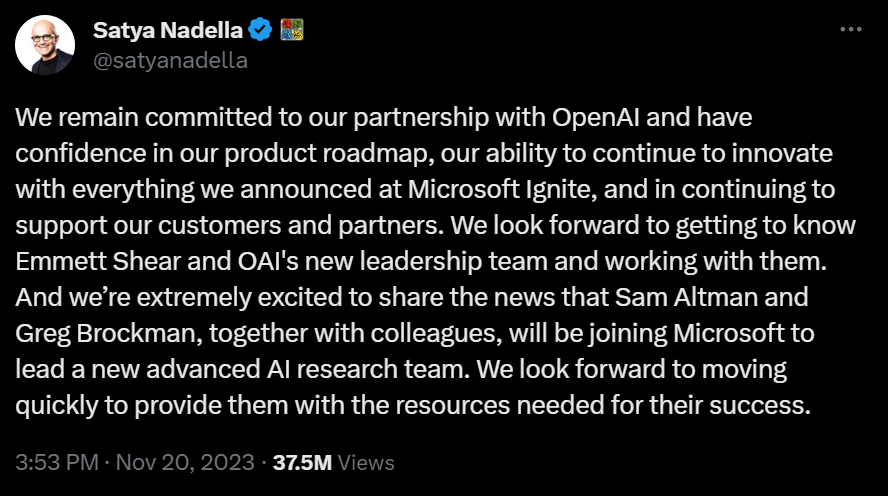OpenAI vs. Sam Altman: How the ousting of a CEO unfolded a boardroom drama

- The firing of Sam Altman as the CEO of OpenAI led the rest of the company to call for the dismissal of the remaining board members.
- After a tumultuous weekend marked by apparent shifts in the company’s board and the chief executive role, Altman announced his decision to join Microsoft.
- Microsoft’s share prices rose immediately.
This November 30, ChatGPT will turn a year old. In just 12 months, the AI chatbot has witnessed remarkable success and widespread adoption, attracting over 100 million users within its first two months alone. OpenAI, the small but influential artificial intelligence startup behind the ChatGPT chatbot, has equally had an extraordinary ascent in the past year — until last week, when the CEO and founder, Sam Altman, was not only ousted by the board but also, adter significant backlash to his firing, joined Microsoft, the startup’s biggest investor.
The abrupt removal of Sam Altman from his role as the CEO of OpenAI on November 17, 2023 reverberated across the industry. Mainly because since ChatGPT took the world by storm late last year, Altman has emerged as the face of generative AI – celebrated by mainstream media and welcomed as an esteemed guest in many influential events around the world, especially those focused on AI.
In fact, just a day before the unexpected boardroom shake-up, the co-founder and leader of OpenAI was championing the advantages of AI to executives and global leaders at the Asia-Pacific Economic Cooperation summit in San Francisco.
The following day, he was dismissed abruptly. The board has been tight-lipped about the reasons for his departure. However, a blog post on OpenAI’s website stated that the board “no longer has confidence” in Altman’s leadership because “he was not consistently candid in his communications with the board.”
The unexpected removal was even more astonishing, considering how Altman had appeared to be at the pinnacle of his influence. Having recently concluded a world tour, Altman had met with leaders in various countries, having closed doors and open discussions on AI. But it didn’t take long after Altman’s surprise removal for Greg Brockman, the chairman of the board and another co-founder, resigned in response to the former’s termination.
Sam and I are shocked and saddened by what the board did today.
Let us first say thank you to all the incredible people who we have worked with at OpenAI, our customers, our investors, and all of those who have been reaching out.
We too are still trying to figure out exactly…
— Greg Brockman (@gdb) November 18, 2023
What happened after Friday’s announcement?
When Brockman announced he would be leaving the company, he also detailed how co-founder Ilya Sutskever and other board members notified Altman of the decision over a Google Meet call shortly before the announcement went public. The following day, amid the boardroom tussle in OpenAI, three senior researchers resigned in response to Altman’s departure, as reported by The Information.

Ousted OpenAI CEO wearing a ‘guest’ tag for the meeting with board members over the weekend. Source: X.com.
Disregarding these concerns, the board appointed Emmett Shear, the former CEO of Twitch, on Sunday. All the decisions made by the board since Friday were independent of their investors, leaving Satya Nadella, Microsoft’s CEO, unaware. It’s worth noting that Microsoft is the largest investor, with a substantial US$13 billion investment in OpenAI.
Despite setting a 5pm PT deadline on Saturday for the board to reinstate Altman and Brockman, which the remaining board members ultimately missed, employees took to social media, emphasizing that “OpenAI is nothing without its people.” By Monday morning, OpenAI employees strongly supported Altman, with many indicating their intention to leave the company in a widespread exodus.
In a letter addressed to the board, employees expressed the opinion that the directors had “compromised our mission and the integrity of our company” when terminating Altman and his co-founder Brockman on Friday. According to an individual with direct knowledge of the matter, as of 6 pm local time on Monday, November 20, 747 out of 770 employees had urged the board to resign.
In the open letter to the board, Sutskever’s name too appeared, indicating that he had flipped on the board members, even though he had played a key role in the ousting of Altman just days earlier.
“I deeply regret my participation in the board’s actions,” Sutskever said in a post on X, formally Twitter. “I never meant to harm OpenAI.” Another signatory was top executive Mira Murati, who was appointed to replace Altman as CEO when he was removed on Friday but was herself cast aside for the job over the weekend.
At the same time, the newly appointed CEO, Shear, has been facing challenges obtaining written documentation outlining the board’s specific rationale for Altman’s dismissal. The information has not been disclosed to the company’s investors either, as reported by various media, quoting sources familiar with the matter. Shear stated in a note to employees on Sunday night that his top priority is to “engage an independent investigator to thoroughly examine the entire process leading up to this point and produce a comprehensive report.”
What does OpenAI have against former CEO Sam Altman?
Before the events of last week, OpenAI was reportedly engaged in discussions to finalize a fundraising deal, potentially valuing the business at US $ 80 billion. Altman as CEO was closely associated with the triumph of ChatGPT, which garnered 100 million users within two months of its launch on November 30, 2022 – so where that funding deal now stands is uncertain.
Altman served not only as OpenAI’s CEO but also as the symbol of an AI revolution that has captivated the public and investors while raising concerns among industry insiders and experts.
Despite which, the board gave no further details about the communications in question besides just emphasizing the lack of candidness “in his communications with the board,” which was “hindering its ability to exercise its responsibilities.”
Nevertheless, reports indicate that Altman, during OpenAI’s inaugural developer conference earlier this month, unveiled a strategy to establish an app store for AI agents, making the most of OpenAI’s technology. Additionally, according to Bloomberg, Altman was reportedly seeking investment from Middle East sovereign wealth funds to produce AI chips that rivaled Nvidia’s.

OpenAI CEO Sam Altman speaks during the OpenAI DevDay event on November 06, 2023 in San Francisco, California. Altman delivered the keynote address at the first ever Open AI DevDay conference. Justin Sullivan/Getty Images/AFP (Photo by JUSTIN SULLIVAN / GETTY IMAGES NORTH AMERICA / Getty Images via AFP)
Previous reports from The Information also suggested Altman was exploring the prospect of collaborating with ex-Apple designer Jony Ive on developing AI-focused hardware, potentially funded by Softbank.
Microsoft to the rescue
The biggest investor in OpenAI, Microsoft, has chosen to avoid risking Altman applying his tech expertise elsewhere. On Monday, OpenAI’s former CEO announced he would join the Seattle-based tech giant to lead an as-yet-unformed AI research team.
Nadella wrote on X that Altman would lead “a new advanced AI research team.” OpenAI’s former co-founder, Brockman, will accompany Altman, and based on the number of staff members posting on X on Monday, he will be bringing some of OpenAI’s top talent with him, too.
No, seriously, what?
In short, there are jobs for all OpenAI staff if they want to join Microsoft. In an interview with CNBC, Nadella said he was open to working with OpenAI or working with the OpenAI employees who come to Microsoft. “At this point… it’s very clear that something has to change around the governance [at OpenAI],” he added, saying the firms would be in dialogue about this.

Altman could be the first of many defections straight to Microsoft. Source: X.com










